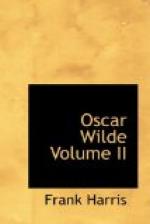And sharp the link of life
will snap,
And dead on air
will stand
Heels that held up as straight
a chap
As treads upon
the land.
So here I’ll watch the
night and wait
To see the morning
shine
When he will hear the stroke
of eight
And not the stroke
of nine;
And wish my friend as sound
a sleep
As lads I did
not know,
That shepherded the moonlit
sheep
A hundred years
ago.
THE BALLAD OF READING GAOL
It is sweet to dance to violins
When Love and
Life are fair:
To dance to flutes, to dance
to lutes,
Is delicate and
rare:
But it is not sweet with nimble
feet
To dance upon
the air!
And as one sees most fearful
things
In the crystal
of a dream,
We saw the greasy hempen rope
Hooked to the
blackened beam
And heard the prayer the hangman’s
snare
Strangled into
a scream.
And all the woe that moved
him so
That he gave that
bitter cry,
And the wild regrets, and
the bloody sweats,
None knew so well
as I:
For he who lives more lives
than one
More deaths than
one must die.
There are better things in “The Ballad of Reading Gaol” than those inspired by Housman. In the last of the three verses I quote there is a distinction of thought which Housman hardly reached.
“For he who lives more
lives than one
More deaths than
one must die.”
There are verses, too, wrung from the heart which have a diviner influence than any product of the intellect:
The Chaplain would not kneel to
pray
By his dishonoured grave:
Nor mark it with that blessed Cross
That Christ for sinners gave,
Because the man was one of those
Whom Christ came down to save.
* * * * *
This too I know—and
wise were it
If each could know the same—
That every prison that men build
Is built with bricks of shame,
And bound with bars lest Christ should see
How men their brothers maim.
With bars they blur the gracious
moon,
And blind the goodly sun:
And they do well to hide their Hell,
For in it things are done
That Son of God nor son of man
Ever should look upon!
The vilest deeds like poison weeds
Bloom well in prison-air:
It is only what is good in Man
That wastes and withers there:
Pale Anguish keeps the heavy gate,
And the Warder is Despair.
* * * * *
And he of the swollen purple throat,
And the stark and staring eyes,
Waits for the holy hands that took
The Thief to Paradise;
And a broken and a contrite heart
The Lord will not despise.
“The Ballad of Reading Gaol” is beyond all comparison the greatest ballad in English: one of the noblest poems in the language. This is what prison did for Oscar Wilde.




